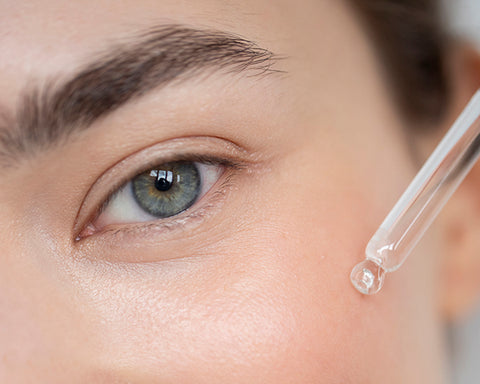Introduction to hyaluronic acid
Hyaluronic acid, a molecule naturally present in our body, has gained considerable notoriety in recent years for its many benefits. Renowned for its ability to retain water, providing hydration and plumpness to skin, this powerful substance is essential for keeping skin hydrated and youthful looking.
Hyaluronic acid is found in every tissue of the body, but its concentration is particularly high in the skin. However, with age, the amount of hyaluronic acid in our body tends to decrease. This leads to dry skin, wrinkles and signs of aging. Fortunately, hyaluronic acid can be taken both through dietary supplements and applied topically through skin products.
When it comes to hyaluronic acid, it's important to note that not all forms are created equal. There are different forms of hyaluronic acid, each with its own properties and benefits. It is essential to know the difference to choose the product that best suits your needs.
The science behind hyaluronic acid

The science behind hyaluronic acid is fascinating. This molecule is a glycosaminoglycan, a type of polysaccharide that plays a crucial role in the skin. It works as a powerful moisturizer, holding water in the skin and helping to keep it supple and plump.
Hyaluronic acid can hold up to 1,000 times its weight in water. This amazing water-holding ability makes it a key ingredient in many skincare products, including moisturizers, serums, and dermal fillers. When applied to the skin, Hyaluronic Acid attracts water and retains it, helping to keep skin hydrated and youthful looking.
In addition, hyaluronic acid plays an important role in wound healing: it helps regulate inflammation, stimulates the production of new skin cells and can even help prevent scarring. These benefits make hyaluronic acid a valuable ingredient in many skin care products.
Benefits of hyaluronic acid
Hyaluronic acid offers a number of benefits for the skin and body. One of the best-known benefits of hyaluronic acid is its ability to hydrate the skin. Thanks to its amazing ability to retain water, hyaluronic acid helps keep skin hydrated, smooth and plump.
In addition to hydration, hyaluronic acid can help reduce the appearance of wrinkles and fine lines. When skin is properly hydrated, it appears fuller and wrinkles and fine lines are less visible. Hyaluronic acid can also stimulate the production of collagen, a protein that helps keep skin supple and youthful.
Another benefit of hyaluronic acid is its ability to aid in wound healing. As mentioned above, hyaluronic acid can help regulate inflammation, speed healing, and prevent scarring. This makes it a valuable ingredient in many skin care products, including creams, serums and wound treatments.
How to use hyaluronic acid

Hyaluronic acid can be used in a number of ways to improve skin health. It can be applied topically through skin care products such as moisturizers , specific serums and face masks . When applied to the skin, hyaluronic acid penetrates the epidermis, the surface layer of the skin, where it retains water to keep the skin hydrated and plump.
Additionally, hyaluronic acid can be taken in the form of dietary supplements . Hyaluronic acid supplements can help restore hyaluronic acid levels in the body, helping to keep skin hydrated and youthful from within.
It is important to note that hyaluronic acid must be used correctly for best results. When applying hyaluronic acid to the skin, it's important to be careful not to apply too much product. Too much hyaluronic acid can make skin sticky and can prevent other ingredients from being absorbed. Additionally, it is important to apply hyaluronic acid to clean, moist skin to optimize its absorption and moisturizing benefits.
The role of hyaluronic acid in skin care
Hyaluronic acid plays a crucial role in skin care: as we've already mentioned, it's a powerful moisturizer that holds water in the skin, helping to keep it hydrated and plump. This makes it a key ingredient in many skin care products, such as moisturizers, serums and dermal fillers.
In addition to hydration, hyaluronic acid can help fight the signs of aging. It can help reduce the appearance of wrinkles and fine lines, stimulate collagen production, and keep skin supple and youthful.
Additionally, hyaluronic acid can help heal wounds and prevent scarring. This makes it a valuable ingredient in many skin care products, including wound treatments and scar care products.
How to take hyaluronic acid with food

In addition to topical application and supplements, hyaluronic acid can also be ingested through nutrition . Many foods naturally contain hyaluronic acid, including potatoes, green leafy vegetables, soybeans, and fruits. Consuming these foods can help maintain hyaluronic acid levels in the body.
Additionally, certain foods can help stimulate the production of hyaluronic acid in the body. These include foods rich in amino acids , such as chicken, beef, fish and eggs, and foods rich in vitamin C , such as citrus fruits, red peppers and strawberries.
It is important to note that while nutrition can help maintain hyaluronic acid levels, it cannot completely replace the loss of hyaluronic acid that occurs with aging. For this reason, it may be useful to supplement the diet with hyaluronic acid-based skin care products or food supplements.
Myths and facts about hyaluronic acid
There are many myths and facts about hyaluronic acid. One of the most common myths is that hyaluronic acid can cause allergic reactions. Actually, hyaluronic acid is a very safe ingredient and well tolerated by most people. It is a natural substance found in the body and rarely causes allergic reactions.
Another common myth is that hyaluronic acid can make your skin oily. In fact, hyaluronic acid helps balance the skin's hydration levels, helping to prevent both dryness and excess sebum. It can be used with confidence on all skin types, including oily skin.
An important fact about hyaluronic acid is that its effectiveness depends on its molecule. There are several forms of hyaluronic acid, each with a different molecular weight. Low molecular weight hyaluronic acid can penetrate deeper into the skin and offer anti-aging benefits, while high molecular weight hyaluronic acid offers superior moisturizing benefits.
Risks and side effects of hyaluronic acid

Although hyaluronic acid is generally safe and well tolerated, as we have said, it can rarely cause some side effects. These can include redness, itching or irritation of the skin. These side effects are usually mild and disappear on their own after a short time.
In rare cases, hyaluronic acid can cause allergic reactions. These can include rashes, swelling or difficulty breathing. If these reactions occur, it is important to stop using the product and consult a doctor.
It's important to note that injectable hyaluronic acid, such as that used in dermal fillers, can cause more serious side effects. These can include swelling, bruising, lumps or asymmetries. For this reason, it is important that hyaluronic acid injections are performed only by a qualified professional.
How to choose a quality hyaluronic acid product
When choosing a hyaluronic acid product, it's important to consider a number of factors. First of all, it is essential to check the product label. Make sure hyaluronic acid is one of the main ingredients. Additionally, it's important to look for a product that contains a form of hyaluronic acid that is appropriate for your needs.
Furthermore, it is important to consider the concentration of hyaluronic acid in the product. Many skincare products contain only a small percentage of hyaluronic acid. Look for a product with a hyaluronic acid concentration of at least 1%.
In conclusion, hyaluronic acid is a powerful molecule that offers a number of benefits for the skin and body. Whether you choose to use it through skincare products, dietary supplements, or nutrition, hyaluronic acid can help keep your skin hydrated, smooth, and youthful.

Leave a comment